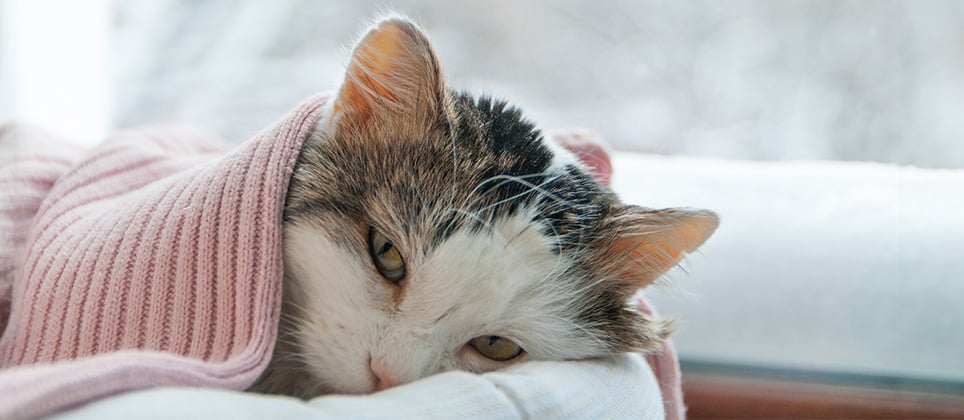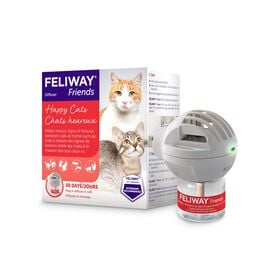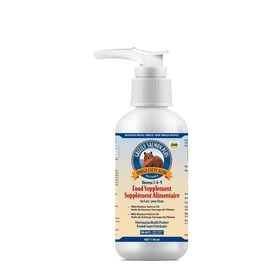It’s true, your cat can catch a cold too! Fortunately, with prevention, home care, and veterinary treatments, we can help Kitty get through this challenge with nose held high.
What exactly is “cat cold”?
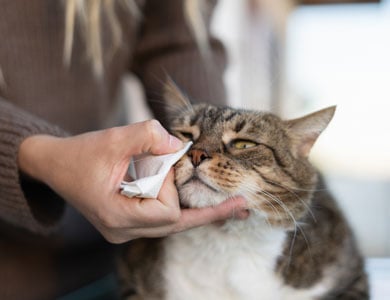
Feline viral rhinotracheitis is a highly contagious viral disease that causes inflammation of the nose, sinuses, and trachea. It’s very common among stray cats, shelter cats, and unvaccinated cats.
This feline cold is mainly caused by feline herpesvirus type 1 (FHV-1), but it can also involve unwelcome guests like calicivirus or even chlamydiosis.
How is it transmitted?
The virus loves to travel. It spreads:
- Through the air: A cat’s sneeze can go farther than you think.
- By contact: Bowls, cushions, toys, cat trees… everything counts.
- By you: If you cuddle a sick cat outside and then touch Kitty without washing your hands, bingo! Transmission.
Good to know:
A cat can remain a lifelong carrier without always showing symptoms.
Stress (moving house, a new cat roommate, vet visits…) can reactivate the virus.
Two cats on separate balconies can still infect each other if the balconies are close. The virus loves drafts.
Symptoms: When should you worry?
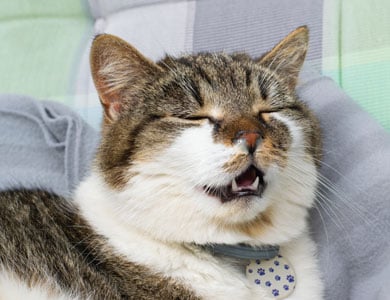
Symptoms vary, but the most common are:
- Sneezing, coughing
- Clear or purulent discharge from nose and eyes
- Conjunctivitis, red or closed eyes
- Excessive drooling, sometimes with mouth ulcers
- Fatigue, fever, loss of appetite
- And in severe cases: pneumonia
Important : A cat with a cold who eats and stays active can often recover with a little help. But if he stops eating, becomes lethargic, or has trouble breathing, see a vet immediately.
Home care when Kitty is sick:
- 1. Regular cleaning: Use a warm compress to clean eyes and nose several times a day. This prevents crusts and blockages.
- 2. Tasty meals: Offer canned food (easier to swallow than kibble with a sore throat). Warm it slightly to boost smell and add water for hydration.
- 3. Rest, rest, rest: Keep him in a quiet, warm spot away from noise and other pets.
- 4. No outings or group cuddles: Even if he feels better, he remains contagious for up to 2 weeks after symptoms end.
When to see the vet:
Consult a veterinarian promptly if Minou refuses to eat, has difficulty breathing, seems very lethargic or feverish, or if their eyes are severely affected (crusted, half-closed or closed), or if they develop ulcers in the mouth or on the tongue.
Possible treatments:
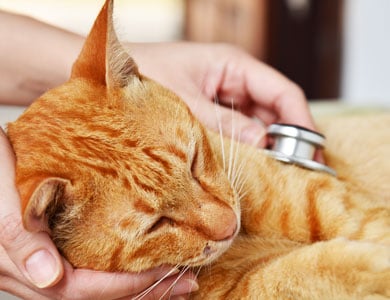
Possible treatments include antibiotics if a bacterial infection accompanies the viral infection, anti-inflammatories to relieve pain, reduce fever, and improve overall comfort, as well as antivirals in the most severe cases.
The best weapon: prevention (thank you, vaccines!)
The core vaccine protects against:
- Feline herpesvirus (FHV-1)
- Calicivirus
- Feline panleukopenia
- Chlamydiosis
Recommended vaccination schedule: Your vet will help choose the right protocol based on lifestyle and exposure risk.
- Kittens: Most at risk. Vaccines are crucial and the full protocol ensures optimal protection. Starting at 6 weeks, boosters every 4 weeks until 16–20 weeks, then a booster at 1 year.
- Unvaccinated adult cats: 2 doses 4 weeks apart, then a booster a year later.
- Boosters afterward: Every 3 years for indoor cats with low exposure, and every year for cats that go outside, live with other cats, or stay in a boarding facility.
Life after the cold?
A cat who’s had rhinotracheitis can remain a latent carrier for life. This means he can infect other cats even if he looks healthy. So if you have multiple cats, be cautious during recovery.
And don’t forget to keep cuddling your kitty, he can’t infect you, even if he sneezes on your pillow!
